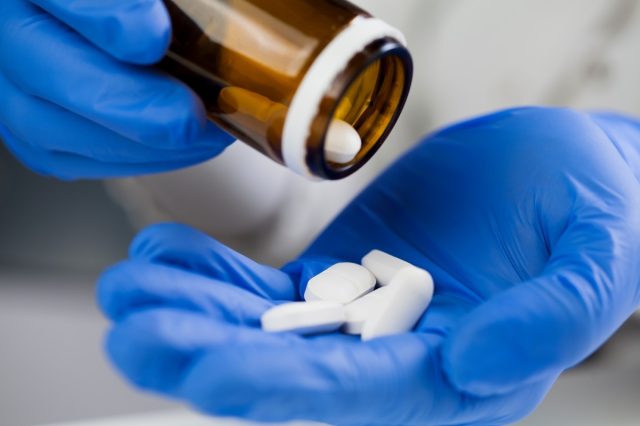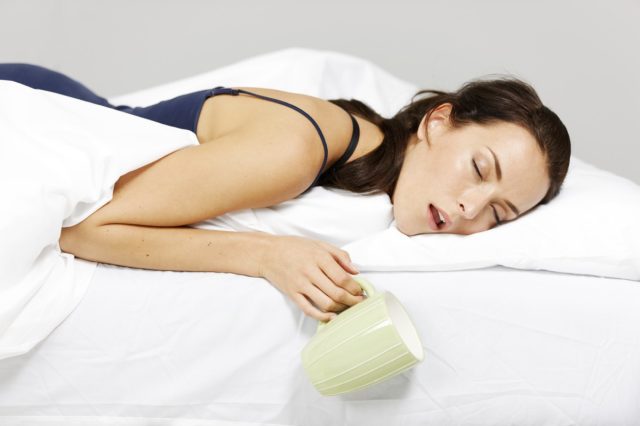The liver is a three pound organ that performs over 500 vital jobs for us daily without a break, so taking care of the liver is essential for overall health. The liver performs important duties like discarding waste, maintaining blood sugar levels, regulating blood clotting and more. You can’t live without your liver so when it’s in trouble, so are you. Eat This, Not That! Health spoke with experts who share seven ways you’re damaging your liver that you might not realize. Read on—and to ensure your health and the health of others, don’t miss these Sure Signs You’ve Already Had COVID.
Dr. Anthony Puopolo, the Chief Medical Officer at RexMD and a board-certified physician tells us, “It comes as no surprise that excessive alcohol consumption can cause liver damage but there is another beverage that can be extremely destructive to that organ and is currently consumed in larger quantities, and that would be soft drinks.. The average American drinks an astounding 45 gallons of this sugary drink every year or just shy of 400 pounds of soda annually. Studies have shown that those who consume excessive amounts of soft drinks have a higher risk of fatty liver disease. This also puts someone at a greater risk of inflammation, fibrosis, and even cirrhosis. Therefore, if you are consuming soft drinks on a daily basis, or even worse, multiple times a day, it would be best to cut that down to limited quantities, as moderation is the best approach.”

Trista Best, MPH, RD, LD says, “A major way we impact the health of our liver is by taking unnecessary supplements. I recommend only taking those vitamins and supplements that have been deemed necessary by your healthcare provider. This is primarily due to the strain that herbal supplements and remedies can place on the liver and kidneys. Some may have negative side effects like constipation, which is why clearing your supplements with your healthcare provider is important. Supplements must be broken down in much the same way as our food. Excess will be filtered by the liver and kidneys and ultimately expelled through the urine. Large amounts of unnecessary supplements can place the liver in undue stress.”

Christine Kingsley, a US Advanced Practice Registered Nurse (APRN) and the Health and Wellness Director of Lung Institute explains, “Consuming too much of the liver-damaging drug acetaminophen a.k.a. Tylenol, in particular, is one of the fastest ways to permanently inflict liver failure on yourself. The danger here is that people often think that the lack of prescription instructions is an invitation to just take any OTC medication as much as they want when, in truth, the liver can be damaged regardless of what drugs are overconsumed. If taking medications is necessary, be sure to consult your physician and read the medicine’s package insert about the dosage and frequency at all times.”

Kingsley reminds us, “Healthy eating habits and well-balanced nutrition are pushed by medical health professionals for a reason, and it’s because the liver can only take on so much. Too much of the wrong food can easily overwork the organ, prompting it to store all the excess fat it failed to break down in its own liver cells which leads to liver inflammation and cell damage over time. Overall, having poor nutrition and unhealthy eating habits puts the liver in a never-ending position of being pushed to its limits until it’s unable to function the way it’s supposed to and is forced to damage itself. Maintain a healthy diet and regularly eat a balanced nutritional diet to not just boost your liver, but to protect it from itself.”

Kingsley shares, “Unfortunately, many people seem to normalize sleep deprivation in order to keep up with our fast-paced modern world. Along with plenty of other detrimental consequences on health, lack of sleep is particularly damaging to the liver due to its oxidative stress effects that lead to higher pressure on the liver. It creates an interference with the organ’s ability to process fat efficiently, causing fat to amass which invites obesity, diabetes, and heart disease to be developed. Not to mention, the liver is one of the most hardworking organs in the body, it relies on the reparative benefits that a full 8-hour restful sleep provides to keep itself well-functioning. When there’s a constant lack of sleep, however, your elimination process becomes disrupted and the liver ends up being damaged. Be sure to get 8 hours of sleep each night to provide your system with all the benefits it needs to fulfill its duties in keeping you alive and well.”

Kingsley emphasizes, “Practicing a sedentary lifestyle is dangerous for your health for so many reasons but it is one of the major catalysts for Non-Alcoholic Fatty Liver Disease and liver damage. An inactive lifestyle increases hepatic fatty infiltration, as well as hepatic inflammation and fibrosis, which increases the risk of NAFLD. Finding a balance between sitting and being comfortable vs being active is key because a healthy amount of physical activity offers improved serum liver enzymes that mainly keep the liver healthy.”

Kingsley explains, “Alcohol drinking has been embedded in a modern social culture that the majority of the population can no longer function without it in their system. While this practice offers some positive benefits, they’re never worth the negative effects it inflicts on the body and the liver. Heavy drinking during the pandemic has led to a sharp increase in the number of people hospitalized for alcoholic liver disease nationwide. Heavy alcohol is the number of liver-damaging culprits, leaving the organ constantly inflamed which increases the risks of fatal conditions like cirrhosis, liver cancer, and liver failure. It’s high time people stop relying heavily on inhibition-suppressants like alcohol: Healthy relationships with alcohol drinking must be developed by establishing a two-drink per day limit.”
Heather Newgen